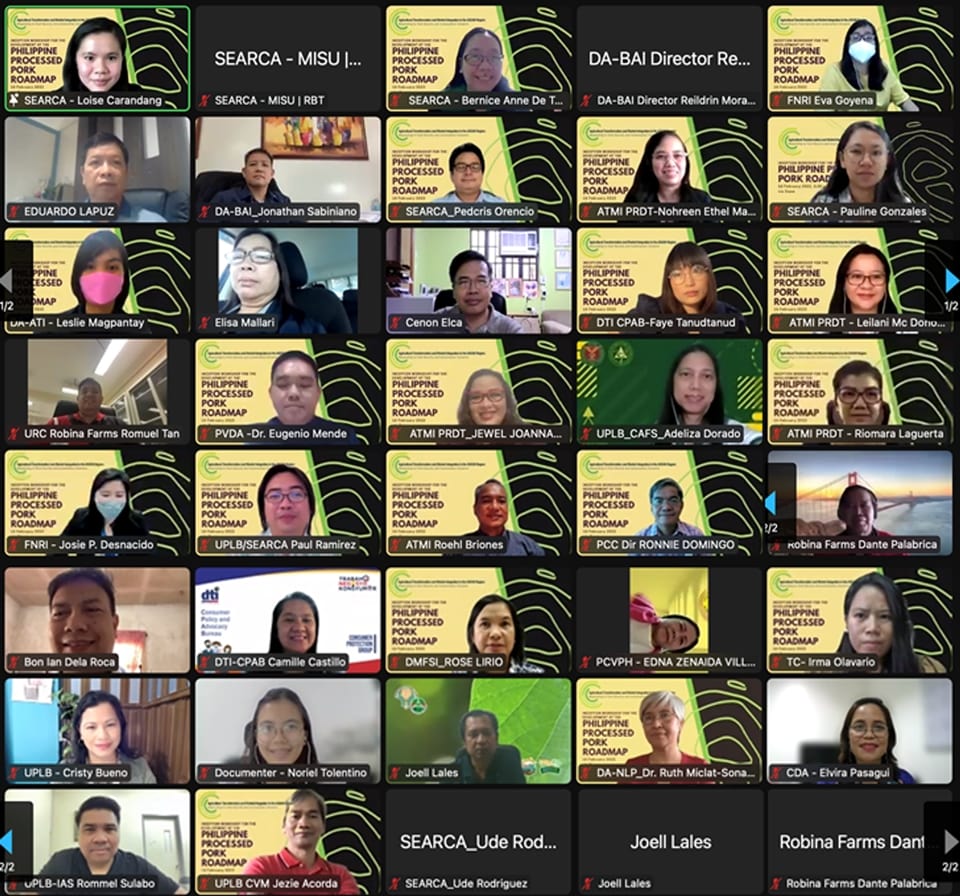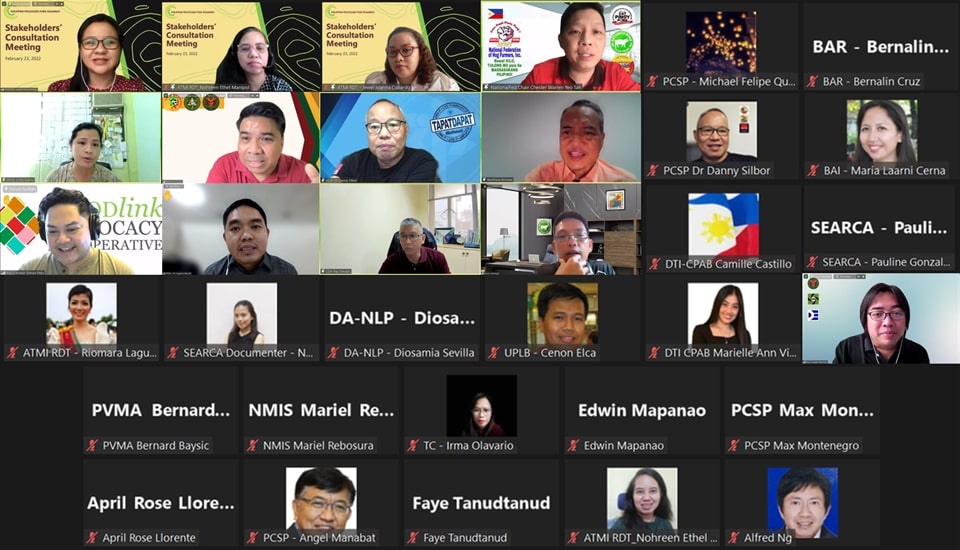
As part of the technical assistance (TA) to the Philippines of the International Fund for Agricultural Development (IFAD)-funded Project Agricultural Transformation and Market Integration in the ASEAN Region: Responding to Food Security and Inclusiveness Concerns (ATMI-ASEAN), the Southeast Asian Regional Center for Graduate Study and Research in Agriculture (SEARCA), in partnership with the Philippine Department of Agriculture (DA), conducted the online Inception Workshop for the Development of the Philippine Processed Pork Roadmap cum Policy Roundtable Discussion on 16 February 2022.
In his Welcome Remarks, Dr. Glenn Gregorio, SEARCA Director, mentioned the timeliness and relevance of this initiative given how the agriculture sector took the frontline during the global crisis. He highlighted how crucial the discussions are in the workshop and roundtable, as a wide range of stakeholders in the agriculture value chain is being engaged in the process of formulating the national roadmap for highly consumed products, such as processed pork.
Dr. Reildrin G. Morales, Officer-in-Charge and Director of the DA-Bureau of Animal Industry (BAI) delivered the message from DA on behalf of the Secretary. He reiterated the timeliness of this initiative in line with the goal to elevate the gain of Filipino farmers, including those in the swine industry who were affected by the African Swine Fever (ASF). Despite the transfer of regulation of the meat processing industry to the Food and Drug Administration by virtue of the Food Safety Act of 2013, Dr. Morales said that the industry, in general, remains to be one of the major importers, making it a “vibrant stakeholder” of DA. In the perspective of DA, if the country’s locally grown animals, like hogs, will be able to meet the requirements of the meat processors, then the output of the livestock sector would have a steady market that can spur growth and expansion of local production, thereby meeting the expanded local demand. Through this activity, Dr. Morales hoped that the outputs would include the “much-needed recommendations for policy consideration” and “workable strategies and programs” for the sector that can be sustained throughout the identified span of the roadmap to be developed.
A roadmap development team led by Ms. Jewel Joanna Cabardo, Assistant Professor of the University of the Philippines Los Baños (UPLB) and the team’s Agribusiness Value Chain Expert, has been engaged by SEARCA to lead the convening of the identified stakeholders of the processed pork value chain. Joining Ms. Cabardo are Ms. Nohreen Ethel Manipol, Assistant Professor of UPLB and the team’s Commodity Expert; Ms. Leilani Briosos-Mc Donough as the Industry Expert & Private Sector Representative, and; Ms. Riomara Laguerta, Research Assistant. Ms. Cabardo and Ms. Manipol, together with representatives from DA, participated in the Training-Workshop on National Roadmap Development facilitated by Dr. Roehlano Briones, Senior Research Fellow of the Philippine Institute for Development Studies (PIDS) and the ATMI-ASEAN national road mapping exercise Lead Technical Consultant.
The final output of this SEARCA-DA collaboration is the Philippine Processed Pork Roadmap, which is aimed to supplement the Hog Industry Roadmap being developed by DA. The highlights of the latter, titled Rebooting the Philippine Hog Industry, 2022-2027, were presented in the workshop by Dr. Ruth Miclat-Sonaco, Director of DA’s National Livestock Program and of the International Training Center on Pig Husbandry (ITCPH) of DA-Agricultural Training Institute (ATI). This was followed by the presentation of the Inception Report prepared by the roadmap development team and an open forum to solicit insights and feedback from the stakeholders on the data collected and proposed plans in moving forward with the exercise.
The second part of the program was focused on the discussion of policy issues and recommendations arising from the value chain study conducted in 2019 by the UPLB research team led by Assistant Professor Cenon Elca. These were presented with the aim of soliciting insights from the stakeholders on the issues identified and updating the recommendations of the study, as necessary, in view of the impacts of ASF and COVID-19 in the processed pork-based products value chain.
The activity was well-attended by around 50 multisector stakeholders from relevant government agencies, the private sector, identified key livestock industry players, and the academe. The roadmap development team shared with the stakeholders the participatory approach to be used and the proposed activities lined up for the successful development of the Philippine Processed Pork Roadmap. During the discussions, various stakeholders signified their commitment to providing inputs to and information on the segments of the roadmap document and participating in the succeeding sessions and activities of this undertaking.
Dr. Briones emphasized in his synthesis that moving forward with the development of the Philippine Processed Pork Roadmap, the continuing challenge is focusing on the smallholders’ participation. Reiterating the country’s large importation of pork, Dr. Briones envisioned the roadmap to be developed to help the smallholders expand their market when they achieve the requirements of the processed pork industry, and encourage the processed pork industry to reach out and actively engage with the smallholders with support from various entities, such as government agencies and private companies.
Dr. Pedcris Orencio, Program Head of SEARCA’s Research and Thought Leadership Department (RTLD) and the Principal Investigator of the ATMI-ASEAN Project, closed the workshop cum roundtable discussion by congratulating and thanking everyone for their active participation and for their commitment to the succeeding undertakings in advancing this activity towards meeting the ultimate objective of developing a national roadmap for the processed pork industry. This will help ensure smallholders’ participation in the process to achieve inclusive and greater impacts from the standpoint of development.
Following this event, a series of consultation meetings and validation workshops will be organized every Wednesday starting on February 23 until March 30. During the first meeting, the roadmap development team and the stakeholders discussed the highlights of the inception workshop. They also discussed the industry situation, performance and outlook, and cost-and-return analysis of the roadmap.

This week on March 2, the team and stakeholders will conduct value chain mapping and discuss and analyze the strengths, weaknesses, opportunities, and threats (SWOT) in the processed pork value chain. In the next two weeks, benchmark and competitive analyses and discussion of market trend, prospects, and key demand drivers will be conducted on March 9; while the presentation of the first draft processed pork roadmap, followed by the target-setting exercise, are scheduled on March 16.